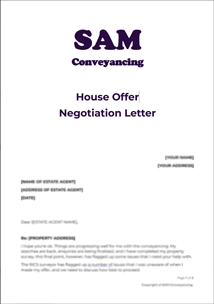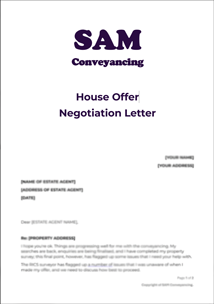How to negotiate house price
Negotiating house price is a common practice, especially in the property market of 2026. With inflation rates going up and base rate still high, many homebuyers might try to negotiate their offers.
Knowing how to negotiate the house price can be difficult; too low, and you could lose the property; too high, and you could buy a property that is going to cost you thousands to repair.
How do you negotiate a low offer on a house?
If you're making a lower offer and negotiating the house price, you must always be prepared to either compromise or be rejected. Always have factual evidence to support your offer, such as similar properties in the area and their prices or, if you're negotiating a house price after the offer is accepted, a survey report flagging defects.
What was the average reduction negotiated from the asking price in 2025?
2025 was a buyer's market and asking prices were heavily negotiated.
Negotiation Adopted | Percentage of Buyers |
Paid below asking price | 39% |
Paid full asking price | 39% |
Paid above asking price | 10% |
Did not negotiate (e.g. fixed price) | 12% |
Source: Zoopla and Rightmove.
How to negotiate at different stages in the Conveyancing Process
How you approach reducing the asking price will depend on which stage of the process you're at.
How to negotiate house price when making an offer
-
1
Figure out how much you can afford to offer
-
2
Research similar properties in the area and what they sold for
-
3
Base your offer on your findings
-
4
Aim to offer between 5-10% lower than the asking price
-
5
Make a formal offer to the estate agent
Do some research to find out how low you can go below the asking price. You should look up similar properties in the area and see how much they sold for. Properties that have already completed will give the most insights.
Look for homes on your street with the same amount of floor space, bedrooms and bathrooms. Be careful not to look further than that area - a street in itself could add £10,000s to the purchase price.
Under-offer properties will not be as reliable as they haven't completed, so the advertised price could be £250,000, but the accepted house price could be £230,000.
Looking at other properties for sale is not an indication of what your property is currently worth. Asking prices are not always met, and the fact that the seller is asking for this amount of money doesn't mean this is what the property will finally sell for.
The estate agent is employed by the seller to sell the property for them - and it is normally for the highest price possible. So how does the estate agent set the asking price?
- Current asking prices - the estate agent will look to existing properties on their books and their current asking prices as a benchmark.
- Sold properties - the estate agent may have sold or have under offer a property close to your property.
- Competition - the estate agent may have a large number of property buyers on their books ready and waiting for a property like yours. They may use this to set a higher price.
- Market Fluctuations - house prices as a whole mostly increase, except after major events such as the 2008 crash, however local markets fluctuate and the estate agent should take these fluctuations into consideration.
- Closed Bids - the estate agent may run a closed bid where the highest offer wins. This may not be the current asking price because buyers place a bid for what the property is worth to them, not what it is actually worth purely so they win the bid.
- Online Estate Agents - online estate agents such as Purplebricks allow sellers to set their own house price. This may not be based on anything other than what they want to get for the property.
Be aware that just because there is an asking price, it doesn't always mean this is what the property price is worth. Neither the estate agent nor the seller can remain unbiased when setting the sale price.
How to negotiate house price after survey
Negotiating house price after the offer has been accepted is not uncommon. This usually happens because:
- a defect has been found in your property survey, such as damp or subsidence); or
- the mortgage lender's valuer has undervalued the property.
Deduct the costs of fixing house survey problems
House survey defects can be costly to fix. If there are material defects, the costs of these should be deducted from the current market value to find what is fair to pay for the property's current condition. The seller can also do the work to bring the property into a reasonable condition.
If there are defects within the property, then you should obtain 3 quotes from local tradespeople to repair/fix the defects. Some of these may be specialists and costly. By getting 3 quotes, you can use these when negotiating with the seller, and it makes your offer under the asking price more genuine.
You should speak to local tradespeople who undertake the actual work you need fixing. The best place to look for contractors is - CheckaTrade.
Ask for a reduction based on the mortgage lender valuation
When a mortgage lender undervalues the property, you are left with no option but to renegotiate or make up the difference yourself. The latter means you are buying a property that isn't worth what you are paying for it - as of day 1, you are in negative equity.
How to Negotiate House Price when Selling
Getting a lower offer than what you're expecting might seem discouraging, especially if you're trying to sell quickly. There are certain things you can do to make sure you don't have to haggle on the price.
Be realistic about the property price
Similarly to buyers, do some research and see how much properties on your street and with similar characteristics are worth. This will give you a more accurate representation of what to ask for.
Get the house in good condition
You can make minor cosmetic changes, like fresh paint or improve the curb appeal of the property to make it more attractive to potential buyers. The more work they will have to do to the property after purchasing, the more chances you have of getting lower offers.
If you find that the offer is unreasonable, you can reject it and wait for the next potential buyer.
Check if you can fix major structural defects
A home survey will reveal any potential property defects. Major structural issues, like subsidence or signs of damp and mould will be costly for buyers to fix, so they will most likely try to haggle on the price to bring down costs. If you can deal with these problems before putting the house up for sale, the better chances you have of getting what you ask for.
Consider asking for closed bids
When you're selling a house, you also have the option of doing a closed bid. This means any potential buyers can only submit one offer and you then choose the highest offer. You could still get lower offers than you're expecting if the property is in poor condition.
Being realistic about what your property is worth will save you time and unnecessary stress. If the buyers still try to negotiate home price, take your time before deciding. They will usually set a deadline in their initial offer. Be open to seeing what evidence they bring to support their offer.
Download a house price negotiation letter template, free from hassle.
- Instant download.
- Easy to fill in.
- Suitable for negotiating offers after the survey.
- Templates for initial and final offers.
The templates will be attached to your confirmation email after payment. Please allow a couple of minutes for the email to arrive.

Negotiate a win-win by understanding the seller's priorities
In any successful negotiation, both sides need to feel they have won. For you, the win is buying your dream home at a price that is reflective of the property's current market value - the cheaper, the better. For the seller, their win is different and might be:
Agree a fair price
- the sellers might not afford to accept a lower offer, as they would've budgeted their onward purchase based on the estate agent's valuation; you might also be dealing with a probate or landlord saleAccomodate their preferred completion date
- they may be looking for early completion, later completion, or flexibility if they've not found a new property yet;Appeal to their sentimental side
- Downsizers may feel better about selling to a new family than to an investment landlord with a higher offer.
Find out what the win is for your seller and work out how much to offer below asking price that still allows them their win; otherwise, you may end up losing your offer to another buyer who is prepared to pay what the seller is asking for.
How much lower should you offer on a house?
The average price reduction when buying a house will usually range between 5-10% less than the asking price. Here are things to consider when working out how much under the asking price you should offer:
Don't offer too low
Going too much below the asking price can mean that you alienate the seller. Whilst there are other considerations, such as the length of time the seller has been on the market and how desperate they are to sell, often going in too low doesn't get your negotiations off to the best start.Justify offering below asking price
It helps to explain to the seller why you have offered a bid lower than their asking price - it makes your reason more tangible.Offer the asking price subject to survey
Offering what the seller is asking gives you an opportunity to defer negotiating until further into the transaction, such as after your survey or mortgage valuation. With so many buyers offering under asking price, it can start your relationship off with the seller on the right foot by offering the asking price.
Unless there is some good reason to do so, you should only ever make an offer that you can afford and that you feel is what it is worth based on your own research.
Andrew started his career in 2000 working within conveyancing solicitor firms and grew hands-on knowledge of a wide variety of conveyancing challenges and solutions. After helping in excess of 50,000 clients in his career, he uses all this experience within his article writing for SAM, mainstream media and his self published book How to Buy a House Without Killing Anyone.
Caragh is an excellent writer and copy editor of books, news articles and editorials. She has written extensively for SAM for a variety of conveyancing, survey, property law and mortgage-related articles.









